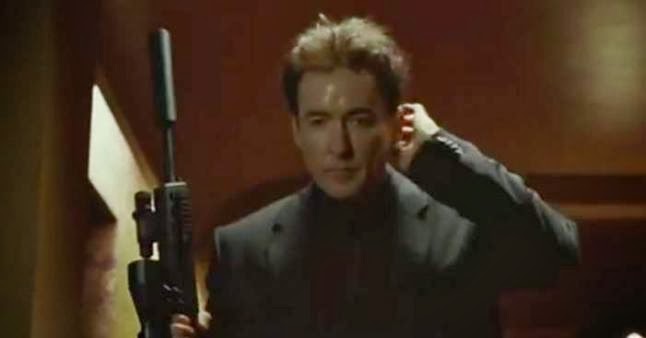As he does so, the scope of a sniper rifle finds him, and directs him offstage where he finds an earpiece has been left for him. Donning the earpiece, Tom enters into a frenzied game of cat-and-mouse that lasts the rest of the performance, in which he must continue to play flawlessly or risk the life of his beautiful wife, who watches unknowing from a box seat. The voice on the other end of the earpiece belongs to John Cusack's character, whose motives are unclear, but seem to have something to do with the missing fortune of Selznick's late mentor, an eccentric and brilliant composer.
For an avid fan of the horror genre (he recently founded The Woodshed Horror Company, which has three films in the works), Wood has been cast in surprisingly few roles on the darker side of cinema. Fans were suitably impressed with his portrayal of silent, cannibalistic serial killer Kevin in Frank Miller's Sin City, and glad to see him land a starring role as the psychopathic Frank in Maniac. The role of Tom Selznick, however, bears a lot more similarity to one of his earliest roles, the skittish high school newspaper photographer in the 1998 sci-fi send-up The Faculty. Selznick has a fear of flying, is a chronic nail-biter, and, as multiple characters remind him within the first act of the film, has a history of being frozen by stage fright in tense situations. In the end, however, he must find a way to turn his frantic nerves from a crutch into a weapon, and play the piano like his life quite literally depends on it.
The electric energy that drives Grand Piano forward can be attributed in large part to its sweeping original score, penned by Mira himself, who is a composer first and foremost. The constant crescendos and brash, discordant notes begin during the credits, setting the soundtrack to a series of close-up shots of piano parts that are made to almost resemble some strange weaponry. The intensity of the score rarely lets up through the film's 90-minute runtime. The music is almost a character in and of itself, with Selznick's late mentor's 'La Cinquette,' believed to be unplayable, starring in the final, fevered sequence of the film.
What is perhaps most notable about Grand Piano is the way the camera seems to follow along with the score, as if the same conductor is leading both. As the tempo of the film builds, so too does the speed of the camera movements, along with the intensity of the colors and drama of camera angles. The film instills a palpable sense of dread from the first scenes, in which slow-panning, voyeuristic shots show Selznick from a distance. We move closer to our hero as his heart rate speeds up and a sweat breaks out on his brow, the intimacy of the camera seeming to echo his paranoia perfectly. As Selznick and the orchestra play, the camera lilts along, following each crescendo, highlighting a section at a time, and traveling in a constant musical arc around Selznick himself. As the action becomes more tense, the camera becomes more frantic, showing Selznick tilted at 90-degree angles, then spinning quickly in a circle as the lighting fades to blood-red.
You'd be hard-pressed to categorize Grand Piano as a horror film, but it just might be the most artistic entry into the thriller sub-genre in many years. Riding along on the waves of Mira's phenomenal score, the film's brief 90 minutes feel like 20, and you the viewer are thrown right into the middle of the most unusual mystery you'll see this year. Grand Piano opens in limited release this Friday.





No comments:
Post a Comment